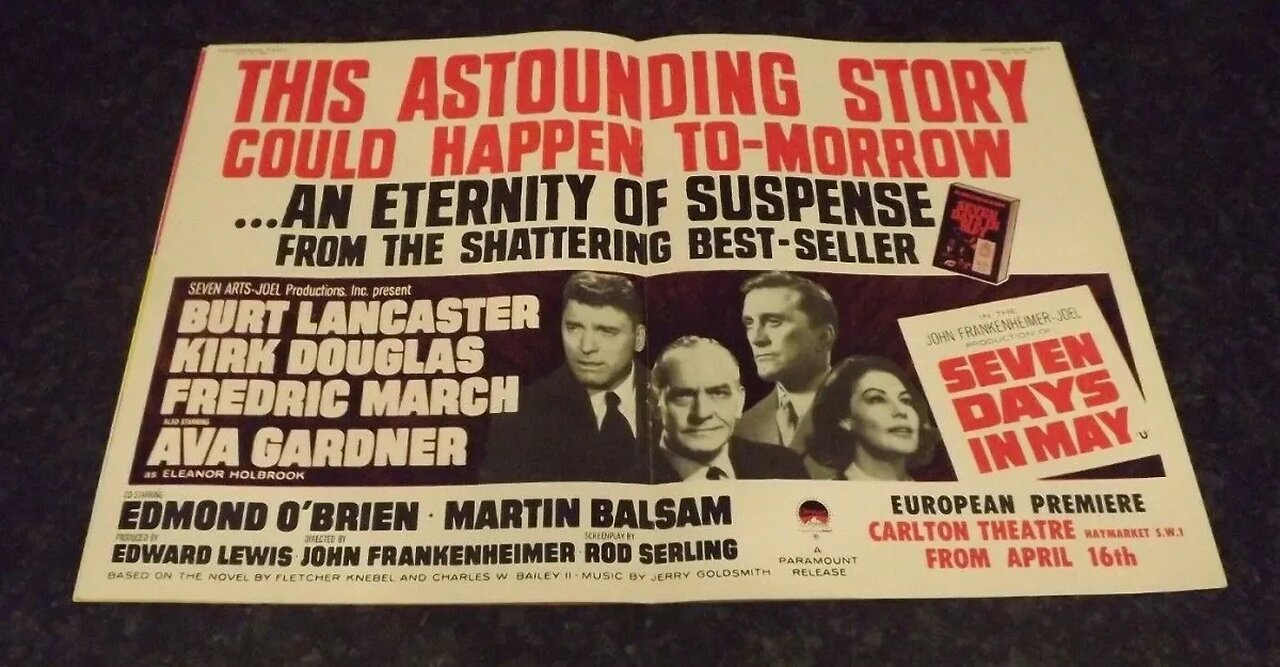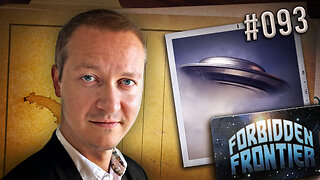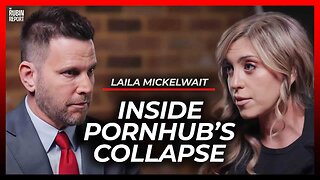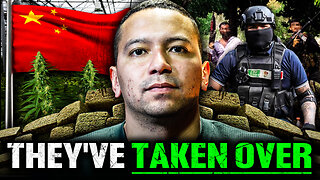Premium Only Content

SEVEN DAYS IN MAY (1964)
Seven Days in May is a 1964 American political thriller film about a military-political cabal's planned takeover of the United States government in reaction to the president's negotiation of a disarmament treaty with the Soviet Union. The Kennedy administration gave its full cooperation in the film's production, which was released about 2 months after the President's assassination.
In the 1960s, the Cold War remained a major security and political problem. The weak and unpopular U.S. President Jordan Lyman recently signs a nuclear disarmament treaty with the Soviet Union, and the subsequent ratification by the U.S. Senate has produced a wave of dissatisfaction, especially among Lyman's political opposition and the military, who believe that the Russians cannot be trusted. His popularity has reached an all-time low of 29%, there is rioting about the treaty right outside the White House and he is warned of a dangerous cardiac condition by the presidential physician, which he blithely disregards, too busy and beleaguered to take a prescribed two-week vacation.
United States Marine Corps colonel "Jiggs" Casey is the director of the Joint Chiefs of Staff. He serves its chairman, four-star United States Air Force general James Mattoon Scott, a former air ace who earned six Purple Hearts, two Distinguished Service Crosses and the Medal of Honor.
Casey stumbles upon evidence that Scott is leading the Joint Chiefs to stage a coup d'etat to remove Lyman in seven days. Under the plan, disguised as a training exercise, a secret army unit known as ECOMCON, training at a secret Texas base, will take control of the country's telephone, radio and television networks while the president, participating in a staged "alert," is seized. Scott, who is busy advancing his charismatic public persona through nationally televised anti-treaty rallies, is planned to head a military junta. Although personally opposed to Lyman's policies, Casey is appalled by the plot and alerts Lyman.
Still somewhat skeptical, Lyman gathers a circle of trusted advisors to investigate: Secret Service White House detail chief Art Corwin, Treasury Secretary Christopher Todd, longtime advisor Paul Girard and Raymond Clark, the senior U.S. senator from Georgia and a close friend of 21 years.
Casey has deduced that the heads of all branches of the U.S. military but the Navy support Scott's coup scheme, with Vice Admiral Barnswell, then aboard an aircraft carrier in the Mediterranean, apparently the only invited officer to decline. Lyman cancels a previous commitment to participate in Scott's alert, offering the ruse that he will be away for a fishing weekend. He then dispatches Girard to Gibraltar to obtain Barnswell's confession, sends the alcoholic Clark to Texas to locate the secret base and tasks Casey to gather dirt on the general's private life. Meanwhile, the Secret Service surreptitiously films evidence of an attempt to kidnap the president during the phony fishing trip, removing all doubts about the existence of a plot.
Girard successfully secures Barnswell's confession in w g, but it disappears during a plane crash in Spain. Clark is taken captive when he reaches the secret base and held incommunicado for a day and a half before the Sunday coup. Exploiting Casey's longtime friendship with the base's deputy commander Colonel Henderson, Clark convinces Henderson of the actual intent of the impending "alert." Henderson frees Clark and leads an escape back to Washington but is abducted and confined in a military stockade there. In a radiophone conference call with the president, Barnswell denies knowledge of any conspiracy.
Knowing that he cannot prove Scott's guilt, Lyman nevertheless calls Scott to the White House to demand that he and the other conspirators resign. Scott refuses and denies the existence of any plot. Lyman argues that a coup would prompt the Soviets to launch a preemptive nuclear strike. Scott maintains that the American people are behind him. Lyman challenges him to resign and run for office in order to seek power legitimately, but Scott is unmoved. Lyman restrains himself from confronting Scott with the damning letters that Casey had obtained.
Scott meets the other three Joint Chiefs and reasserts his intention to execute the coup. He plans a nighttime network broadcast, but Lyman holds an afternoon press conference to announce that he has fired the four men. As he is speaking, Barnswell's confession, recovered from the plane crash, is handed to him and he delays the conference. In the interim, copies of the confession are delivered to Scott and the other plotters. As the press conference resumes, Scott abandons the plan when Lyman announces that the other three conspirators have resigned.
Lyman delivers a speech on the state of the nation and its values, declaring that the nation gains strength through peace rather than by conflict.
-
 LIVE
LIVE
Nerdrotic
2 hours ago $1.44 earnedInvestigations into the Unknown with Micah Hanks | Forbidden Frontier #093
1,401 watching -
 18:54
18:54
The Rubin Report
6 hours agoHow One Woman Outsmarted Pornhub & Exposed Its Dark Secrets | Laila Mickelwait
75.7K57 -
 LIVE
LIVE
Major League Fishing
5 days agoLIVE! - Bass Pro Tour: Stage 3 - Day 4
465 watching -
 1:05:28
1:05:28
Sports Wars
9 hours agoLebron GOES OFF Over Bronny Hate, Pereira LOSES Belt To Ankalaev At UFC 313, Xavier Worthy Arrested
64.9K10 -
 10:27
10:27
Tactical Advisor
1 day agoDMR or SPR for Civilian Use?
62.3K6 -
 8:21
8:21
DEADBUGsays
1 day agoThe Crossbow Killer
67.3K13 -
 8:40
8:40
Tundra Tactical
1 day ago $10.50 earnedThe Executive Order Wishlist.
69.3K2 -
 7:22:52
7:22:52
SpartakusLIVE
1 day agoSaturday SPARTOON Solos to Start || Duos w/ StevieT Later
160K4 -
 28:40
28:40
SLS - Street League Skateboarding
9 days agoTOP MOMENTS IN WOMEN’S SLS HISTORY! ALL THE 9’s - Rayssa Leal, Leticia Bufoni, Chloe Covell & more…
113K10 -
 2:03:03
2:03:03
The Connect: With Johnny Mitchell
22 hours ago $11.57 earnedHow Mexican & Chinese Cartels Control Illegal Marijuana Cultivation In America Using SLAVE Labor
77.6K13